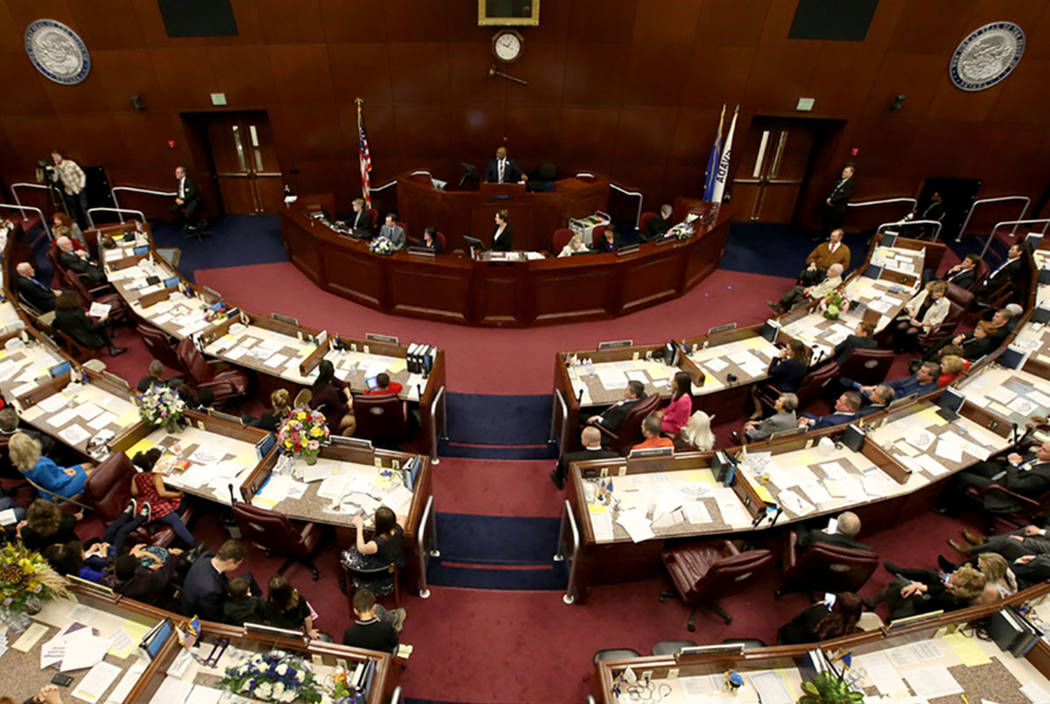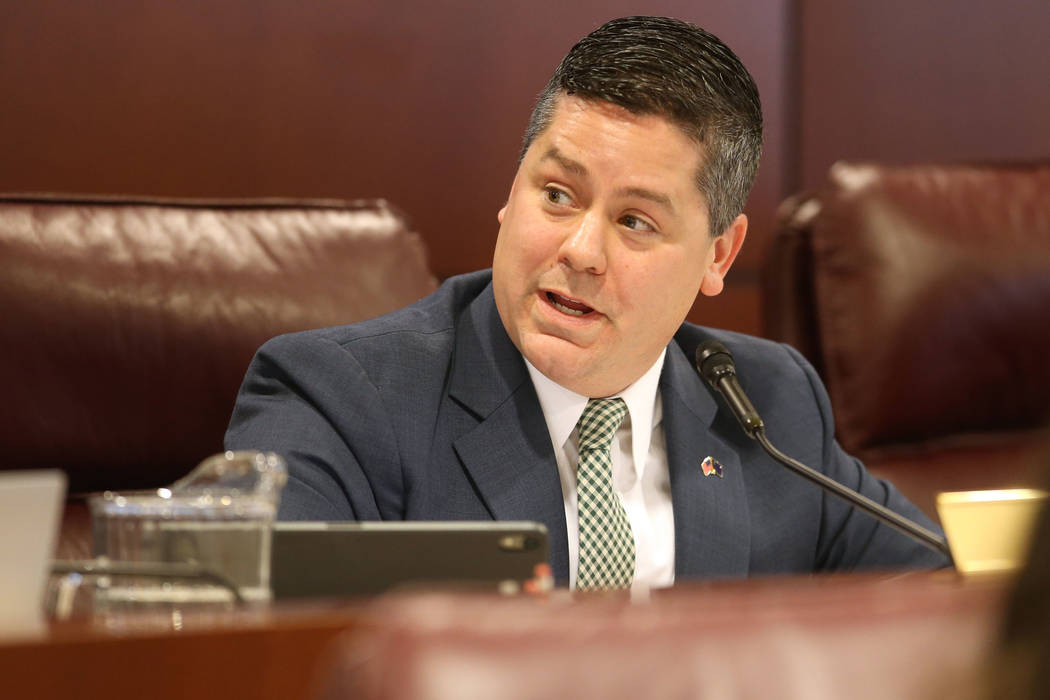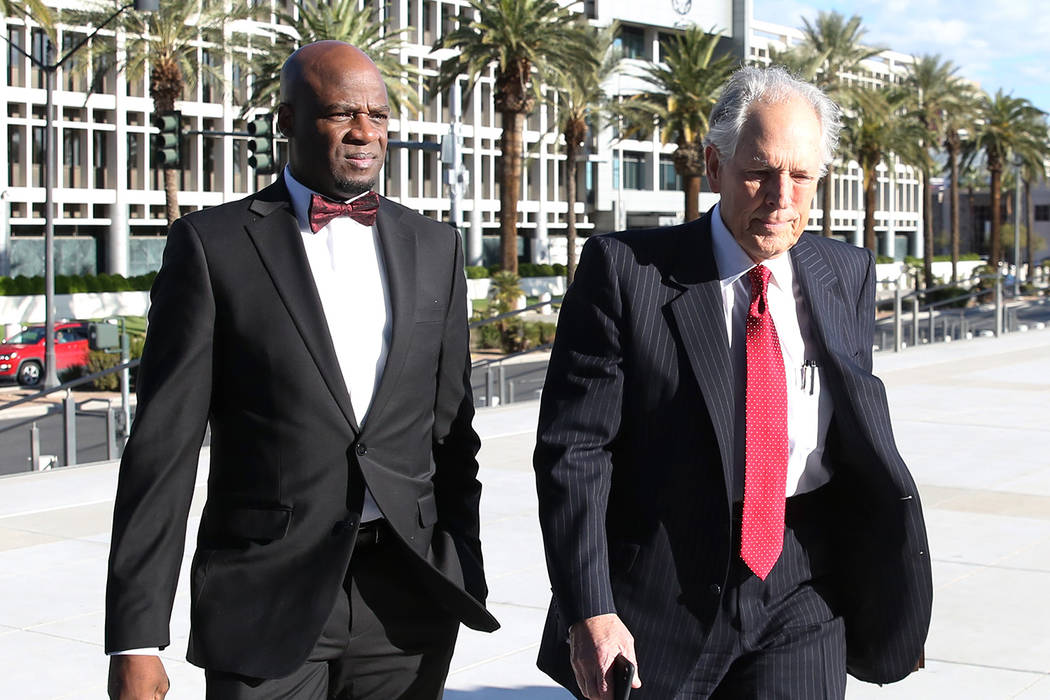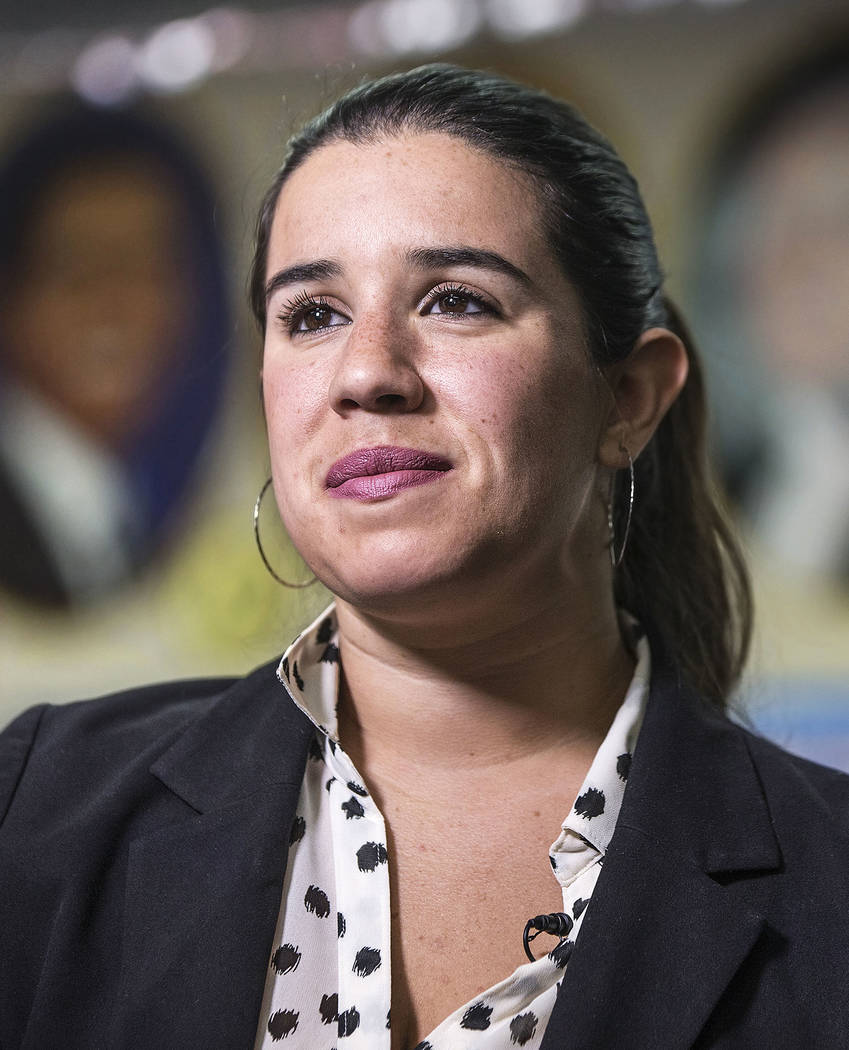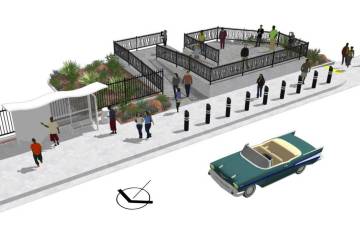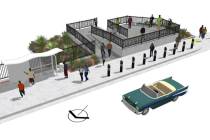Nevada sees many new laws, but how will they affect you?
CARSON CITY — The Nevada Legislature passed nearly 700 bills and resolutions during the 2019 session, from raising the minimum wage and overhauling dozens of criminal justice laws to revamping the state’s five-decade old education funding formula, and more.
Gov. Steve Sisolak signed 638 bills and vetoed just three.
Here’s a look at 131 of those bills, and how they could impact you. (Bills without effective dates may take effect upon signing or on Oct. 1 by statute.)
Business and commerce
Minimum age to work for gaming businesses: No longer does a person have to be 21 to work for a gaming equipment company; 18-year-olds (or even 16-year-olds who are emancipated by a court), can work as licensed gaming employees for gaming manufacturers and distributors. (Assembly Bill 221 effective July 1; signed by governor.)
For railroad employees: Freight trains passing through the state must have two workers on board at all times from now on. (Assembly Bill 337, signed by governor.)
Social work fees: Social workers will be paying more to the Board of Examiners for Social Workers for application and licensing fees. (Senate Bill 502 effective July 1; signed by governor.)
Fewer food deserts: The state will begin offering tax credits for businesses willing to invest in “fresh food retailers” located in food deserts — areas in cities that do not have grocery stores within one mile, or in rural areas within 10 miles. (Assembly Bill 326 effective July 1; not yet signed.)
Higher minimum wages: The state’s minimum wage will gradually rise to $12 per hour over the next five years. Current minimum wage sits at $8.25 per hour for employers that don’t offer health insurance and $7.25 for those that do. That will increase by 75 cents starting July 1, 2020, and will go up each year until it hits $12 for those not offered health insurance, and $11 for those who are, by 2024. (Assembly Bill 456 effective July 1, 2020; signed by governor.)
Not only that, but lawmakers began the process of amending the state constitution to set a flat minimum wage for everyone (regardless of health insurance) at $12 per hour, and to give the Legislature the power to raise the wage in the future. Assembly Joint Resolution 10 must be approved again in 2021 and then go to the voters before it takes effect.
Insurance for minimum wage workers: Employers will be required to provide a minimum level of health insurance to workers in order to pay them the lower $7.25 per hour minimum wage. (Senate Bill 192 effective Jan. 1; signed by governor.)
For payday lenders: A new database of payday loans will go in effect in 2020 that will allow the state to better track how those loans are given out and enforce the laws around short-term loans, such limiting monthly payments to no more than 25 percent of the customer’s expected gross monthly income. (Senate Bill 201 effective July 1, 2020; signed by governor.)
Campaigns, elections & voting
Campaign reform: Candidates won’t be allowed to pay themselves a salary from their campaign accounts going forward, and the new law makes clear that candidates can’t use any unspent campaign funds for personal use. Those who get caught violating the laws will face $10,000 penalties, up from the old $5,000. Senate Majority Leader Kelvin Atkinson resigned from the Legislature in March when it was revealed he’d used campaign funds for personal expenses. (Senate Bill 557 effective Jan. 1; signed by governor.)
Polling on Native American land: If county or city clerks open a polling place within Native American reservation boundaries during an election, they will be required to open that same polling location in future elections unless the tribe requests otherwise. (Assembly Bill 137 effective Oct. 1; signed by governor.)
For voters: You’ll be able to vote on the same day you register going forward, and have a longer time to register to vote online. (Assembly Bill 345, not yet signed.)
For the thousands of Nevadans who can’t vote due to felonies: On July 1, some 77,000 people with a felony conviction that bars them from voting will instantly have their right to vote restored. And going forward, anyone released from prison will be allowed to vote as well. (Assembly Bill 431 effective July 1; signed by governor.)
For those who want to recall their elected officials: Things just got a little harder for people looking to kick their elected official out of office. A new law would require county clerks to verify every single signature on a recall petition, as opposed to using a 5 percent sample. It would also require recall organizers to pay for counting the signatures. (Senate Bill 450, signed by governor.)
Civil rights
Marriage, now only for 17-year-olds and older: Nevada did not have an absolute law on the minimum age to marry before this session. But going forward, that bar is set at 17 years of age minimum, and those 17-year-olds would need approval of at least one parent or guardian and for a judge to sign off, under a bill by Assemblywoman Shannon Bilbray-Axelrod, D-Las Vegas. (Assembly Bill 139 effective Oct. 1; signed by governor.)
For people who solemnize marriages: Counties will be allowed to require training for marriage officiants going forward (Assembly Bill 482 effective July 1; signed by governor.)
Prohibition of discrimination in child welfare and adoption cases: It will be illegal to discriminate against those who are deaf, blind, physically disabled, or who possess a medical marijuana card, who want to adopt or argue for child custody or visitation rights. (Assembly Bill 140 effective July 1; signed by governor.)
For victims of sexual assault: The Sexual Assault Survivors’ Bill of Rights gives victims the right to consult with a sexual assault counselor whenever they are subject to a forensic medical exam or interviewed by law enforcement, prosecutors or defense attorneys. (Assembly Bill 176 effective in part on July 1, in full on Jan. 1, 2021; signed by governor.)
For those scared of mind control: Employers will not be allowed to compel microchip implants for their workers. But if you want one yourself, that’s still totally fine. (Assembly Bill 226, signed by governor.)
For immigrants seeking occupational licensing: Licensing boards won’t be able to deny someone from getting an occupational license based solely on their immigration or citizenship status. (Assembly Bill 275 effective July 1; not yet signed)
For cops getting DNA evidence: Search warrants seeking DNA evidence will now have a six-month shelf life, as opposed to the 10-day requirement for most search warrants. (Assembly Bill 16 effective Oct. 1; signed by governor.)
For inmates getting released from prison: The state Department of Corrections must give inmates they release photo identification that includes their full name and age. (Assembly Bill 10 effective May 23; signed by governor.)
More help for indigent defense: The new Department of Indigent Defense Services and Board of Indigent Defense will be tasked with ensuring proper legal representation comes to those most in need. (Assembly Bill 81 effective Oct. 1; nsigned by governor.)
No more statute of limitations for sexual assault with DNA evidence: Nevada used to have a 20-year statute of limitations for sexual assaults, but no more if the suspect can be identified using DNA evidence. (Assembly Bill 142 effective July 1; signed by governor.)
Clear your marijuana possession convictions: If you were convicted of possession of less than an ounce of marijuana in the past — the amount that is now legal to have — you can ask a court to seal that conviction so that it won’t show up on your record anymore. (Assembly Bill 192 effective July 1; signed by governor.)
Seal eviction cases: Evictions cases can be sealed if they have dismissed or denied. (Assembly Bill 266 effective July 1; signed by governor.)
Criminal justice overhaul: The massive criminal justice reform bill championed by Assemblyman Steve Yeager, D-Las Vegas, including — among many other things — allowing some geriatric prisoners to be released to house arrest, increasing the weights to trigger felony drug possession and trafficking charges and allowing earlier parole on low-level offenses. (Assembly Bill 236 effective in part July 1, 2019, in full July 1, 2020; not yet signed.)
Wrongful convictions: Those exonerated or deemed to have been wrongfully convicted can sue the state for damages. Anyone imprisoned for 20 years or longer can receive up to $100,000 per year of incarceration. (Assembly Bill 267, signed by governor.)
Getting out of gang databases: If you are notified by police that you are in a gang database, you will now have the ability to request to be removed. (Assembly Bill 307 effective July 1; signed by governor.)
Community service instead of court fines: A judge can now offer to let someone who can’t afford to pay their fines to instead perform community service. (Assembly Bill 416, signed by governor.)
No jail time for traffic tickets: Under the new law, the Legislature sets forth that people who are arrested for minor traffic violations can be released on their own recognizance unless they’re deemed a danger to the community. (Assembly Bill 434 effective Oct. 1; signed by governor.)
Equal pay protection based on gender: Adds protections in state law ensuring equal pay for equal work based on gender and sets forth a tiered-system of civil penalties for certain employers that increases per offense. (Senate Bill 166 effective Jan. 1; signed by governor.)
Sex trafficking victims can wipe their records clean: New laws expand the list of crimes for which sex trafficking victims can ask the court to seal or vacate the convictions. (Senate Bill 173 effective Oct. 1; signed by governor.)
No sex with people in custody: Makes it clear in the law that cops are not allowed to have any kind of sexual contact with a person they have arrested or detained. (Senate Bill 383 effective Oct. 1; signed by governor.)
For immigrants arrested by police: Before a person arrested by police can be questioned about their immigration status, officers must disclose the purpose of such questions. (Assembly Bill 376 effective Jan. 1; signed by governor.)
Courts
Small claims courts: All small claims must be tried in the township where the defendant lives. (Assembly Bill 9, signed by governor.)
More judges for shorter wait times: Clark County will be getting six new family court judges starting Jan. 4, 2021. (Assembly Bill 43, signed by governor.)
No gag orders in settlements involving sex offenses or discrimination: The agreements could not prohibit a person from disclosing information relating to sex offense crimes or gender-based discrimination by an employer or landlord. (Assembly Bill 248 effective July 1; signed by governor.)
For those with homestead declarations on their properties: Lawmakers increased the equity protected in homestead properties in Nevada from $550,000 to $605,000. (Assembly Bill 481 effective Oct. 1; signed by governor.)
Domestic violence
More ways to serve protective orders: Police will have more ways to serve temporary protective orders, instead of current law which limits them to being served in person only. Extended protection orders will last longer, and people who violate those orders repeatedly will face stiffer punishments. (Assembly Bill 19 effective July 1; signed by governor.)
Longer protection orders: The effective dates of initial temporary protective orders will be extended from from 30 to 45 days in cases of domestic violence, stalking, aggravated stalking, or harassment. (Assembly Bill 410 effective Oct. 1; signed by governor.)
For victims: It will be easier for domestic violence victims to get protection orders against their abusers, as the courts will only be able to base their decision on whether or not the person was a victim. The new laws also increase the penalties for repeated violations of those orders. (Senate Bill 218, signed by governor.)
More crimes count as domestic violence: New laws include more crimes that can be counted as domestic violence, including domestic battery of a pregnant woman, which is punishable at first as a gross misdemeanor and then as a category B felony. Repeat offenders will also face increased penalties. (Assembly Bill 60 effective July 1; signed by governor.)
More privacy for domestic violence victims: Government agencies and public utilities will be required to accept fictitious address instead of real ones from people who are victims of domestic violence. The state already allows the Department of Health and Human Services to issue fictitious addresses as a protective measure to victims of domestic violence, sex trafficking, stalking and sexual assault. (Assembly Bill 41 effective July 1; signed by governor.)
Education
More money for schools: Per-pupil funding will rise by nearly $300 next school year in Clark County, thanks to the increased funding in for the state’s K-12 budget, going from $5,779 in 2018 to $6,067 next school year under the new budget. (Assembly Bill 555, signed by governor.)
For students dealing with trauma: Police will be required to notify the renamed Handle with Care Program if a child has been exposed to domestic violence, the death of a family member, the arrest of a parent and child abuse. Notification that the child has been part of or witnessed a traumatic event will then be sent to schools, which can provide “wraparound” if needed. (Senate Bill 80 effective Jan. 1; signed by governor.)
For homeless students: Schools will be required to identify students who are homeless, unaccompanied or in foster care, and will need to review and adjust those students’ academic plans to maximize course credit hours. The new laws also allow those students them earn credit regardless of attendance. (Senate Bill 147 effective July 1; signed by governor.)
For young students struggling with reading: An additional $63 million will be coming to the state’s Read-by-3 program in the next two years. But a key provision of the original law was removed, and now parents will have to sign off on their child being retained if they do not meet the standards set by the state. The bill was championed by Assemblyman Tyrone Thompson, D-North Las Vegas, who died during the 2019 session. (Assembly Bill 289 effective July 1; not yet signed.)
For military kids in sports: Students whose parents are in the military and who change schools will be immediately eligible to play in any sanctioned sport or other activity at their new school. (Assembly Bill 342 effective July 1; signed by governor.)
Fewer hoops for school volunteers: After a 2017 change added background checks and fingerprinting requirements for most school volunteers, a tweak to those laws should help more parents volunteer in the classroom without those burdens. (Senate Bill 185, signed by governor.)
For students at Zoom and Victory schools: Zoom and Victory school designations, which provide additional funding to low-performing schools in low-income or areas with high numbers of English-language learners, were continued for another two years. Those programs were set to expire on July 1. (Senate Bill 467, signed by governor.)
Revamped funding formula — eventually: Lawmakers approved an overhaul to the state’s 52-year-old K-12 funding formula. The formula will allocate more funding to follow students who are in special education or gifted and talented programs, those at or near the poverty line, or those learning English. That formula won’t be fully implemented until 2021, however. (Senate Bill 543 effective July 1; not yet signed.)
Energy
For low-income residents who want to go solar: Electric utilities will be required to implement expanded community-based solar projects going forward. (Assembly Bill 465, signed by governor.)
For big companies trying to leave NV Energy: It will be tougher to abandon Nevada’s monopoly electric utility going forward. (Senate Bill 547, signed by governor.)
Health care
Pre-existing conditions: Makes Nevada the fifth state to fully incorporate the federal Affordable Care Act’s protections for patients with pre-existing conditions into state law and help consumers navigate and resolve problems with their insurers. (Assembly Bill 170 effective Jan. 1; signed by governor.)
Expanded dental coverage: Instructs the Department of Health and Human Services to seek a federal waiver to add Medicaid coverage for certain types of dental care for diabetics. (Assembly Bill 223, effective July 1; signed by governor.)
Pain medication, Part 1: Amid widespread concern over the opioid epidemic, this bill simplifies the process of prescribing pain medicine to people with cancer, in hospice or under palliative care. (Assembly Bill 239; signed by governor.)
Pain medication, Part 2: Prescriptions for controlled substances will have to be delivered to pharmacies electronically in most cases to cut down on fraudulent scripts. (Assembly Bill 310, effective Jan. 1, 2021 to allow time for adopting regulations and other administrative tasks; signed by governor.)
Surprise medical bills: Requires out-of-network ER providers to bill at in-network rates and work out disputes without putting the patient in the middle. (Assembly Bill 469 effective Jan. 1; signed by governor.)
Maternity care: Requires health plans other than Medicaid or plans provided by local governments to cover maternity care for a surrogate carrying a child for another woman or couple. (Assembly Bill 472 effective Jan.1; signed by governor.)
Family planning: This bill provides $6 million more over two years in grants to local governments and non-profits to provide various types of contraceptives. (Senate Bill 94 effective July 1; signed by governor.)
Abortion law: This bill simplifies and streamlines informed consent procedures for women seeking an abortion and also removes and updates outdated laws. (Senate Bill 179 effective July 1; signed by governor.)
Deaf children: Sets up programs to provide discounted or free hearing aids to lower-income, hearing-impaired children. (Senate Bill 203, various provisions take effect through July 1, 2020.; signed by governor.)
Asthma drug prices: A price transparency bill that requires drug companies to annually disclose information on how they price asthma medications; could keep drug costs down. The bill follows a similar measure from 2017 targeting diabetes drugs carried by state Sen. Yvanna Cancela, D-Las Vegas. (Senate Bill 262, effective Oct. 1; signed by governor.)
Dry needling: Authorizes doctors of Oriental medicine to perform dry needling, a procedure similar to acupuncture. (Senate Bill 355, effective Jan. 1; signed by governor.)
Dental therapists: Establishes the practice of dental therapy, a mid-level provider between hygienist and dentist, to address affordability and a shortage of providers. (Senate Bill 366, fully effective Jan. 1; signed by governor.)
Medical marijuana: Adds anxiety, autism, autoimmune disorders, addiction, anorexia and certain neuropathies to the list of allowable conditions for medical marijuana use. (Senate Bill 430, effective July 1; signed by governor.)
Medical equipment tax: Enacts voter-approved sales tax exemptions sales of certain reusable medical equipment, oxygen delivery equipment and mobility enhancing equipment (such as motorized wheelchairs). (Senate Bill 447, effective July 1; signed by governor.)
Health care system assessment: A Patient Protection Commission will review issues of health care quality, accessibility and affordability and report twice a year to the governor and Legislature. (Senate Bill 544, signed by governor.)
Homeowners and housing
Construction defects: Makes it easier for homeowners to pursue construction defect claims against builders, contractors and others who worked on their homes. (Assembly Bill 421 effective Oct. 1; signed by governor).
Builders warranty: Requires homebuilders to provide to the purchaser of new homes a warranty valid for at least one year from the date of occupancy, with extensions allowed until a claim is resolved or repairs completed. (Assembly Bill 440, signed by governor.)
Evictions: Allows a landlord or tenant to appeal a summary eviction order entered for failure to pay rent. (Senate Bill 74 effective Oct. 1; signed by governor.)
Affordable housing: Certain local governments (in Clark and Washoe Counties) can reduce or subsidize impact and building permit fees and other fees to induce developers to build more affordable housing. (Senate Bill 103 effective July 1; signed by governor.)
Tenant rights: Extends time frame for evictions and limits late fees for unpaid rent. (Senate Bill 151 effective July 1; signed by governor.)
Keeping pets: Residents of state-assisted low-income housing may have pets, if they follow rules about noise, keeping pets controlled and cleaning up after them. (Senate Bill 367 effective Jan. 1; signed by governor.)
Housing assistance: Provides more Medicaid funding to help vulnerable populations such as seniors and the disabled obtain affordable housing. (Senate Bill 425 effective Jan. 1; signed by governor.)
Affording housing tax credits: Provides $10 million in tax credits per year to spur creation of affordable housing. (Senate Bill 448 effective July 1; signed by governor.)
Homeowner associations
Keeping pets, Part 2: Restricts HOAs and other common-interest community associations from prohibiting an owner from keeping at least one pet. (Assembly Bill 161 effective Oct. 1; signed by governor.)
Immigration
Office of New Americans: If you’re an immigrant, refugee or asylum seeker, this new agency directly under the governor was created to help you integrate into American life. (Senate Bill 538, not yet signed.)
Labor
Cosmetology, hair licensing: Reduces the hours of training required to practice cosmetology or be a hair designer or esthetician. (Senate Bill 208 effective July 1; signed by governor.)
Sick leave: Companies and organizations that employ 50 or more workers must offer at least 40 hours of paid sick leave a year. (Senate Bill 312 effective Jan. 1; signed by governor.)
Marijuana job tests: Starting next year, it will be illegal for an employer to refuse to hire you just because you tested positive on a pre-employment test for marijuana. This new law doesn’t apply to firefighters, doctors, or those who drive a vehicle for a living. (Assembly Bill 132 effective Jan. 1; signed by governor.)
Prevailing wage rollbacks: Republicans in 2015 set prevailing wages for school construction projects at 90 percent of the local prevailing wage, raised the cost threshold for projects to $250,000 from $100,000, and exempted charter schools from the law. Democrats this year undid all of that and reverted the prevailing wage laws back to pre-2015 levels. (Assembly Bill 136 effective July 1; signed by governor.)
You can call in sick: Employers won’t be able to make you come into work to report that you are sick or injured. (Assembly Bill 181, signed by governor.)
Safer hospitals: Hospitals and other medical facilities will be required to develop and carry out plans for workplace violence prevention and report such incidents of violence to the state. (Assembly Bill 348, signed by governor.)
Confidentiality for social workers: Social workers who handle child welfare services and child protective services will be allowed to have their personal information, including addresses, considered confidential within the county clerk’s office. (Assembly Bill 362, signed by governor.)
Protections for federal workers: Federal workers felt the impact when the federal government shut down for more than a month starting in late December, and went several weeks without a paycheck. But in Nevada, new laws would protect them and their families in those situations, including forbidding foreclosures on their homes during a shutdown, banning car repossessions and more. (Assembly Bill 393, signed by governor.)
Collective bargaining for state workers … almost: Nevada’s 22,000 state workers will be allowed to bargain collectively for wages and benefits, but the governor will have final say over the numbers. (Senate Bill 135, signed by governor.)
Bargaining changes for school principals and administrators: Like the prevailing wage changes, Democratic lawmakers also undid another 2015 law that put several restrictions on school principals’ and administrators’ ability to collectively bargain. (Senate Bill 153, signed by governor.)
For injured workers: You will have the right to choose your own doctor or chiropractor (Senate Bill 381. Effective Jan. 1; signed by governor.)
License plates
“Vegas Strong” 1 October plate: (Assembly Bill 333, signed by governor)
Women’s suffrage centenary: (Assembly Bill 499, signed by governor)
Electric vehicles: (Senate Bill 181, signed by governor.)
STEM programs: (Senate Bill 402, signed by governor.)
Local government
County commissions: In small counties (all but Washoe and Clark), commissions can pass laws allowing appointments to certain boards and commissions in place of elections. It addresses the potential shortage of candidates and boards that can’t muster quorums. (Assembly Bill 21 effective July 1; signed by governor.)
Local elections: Starting in 2022, all municipal elections would be held on the state election cycle in even-numbered years. It will end odd-year elections in Boulder City, Caliente, Ely, Fallon, Henderson, Las Vegas, North Las Vegas and Yerington, although Boulder City was already transitioning to even-year elections. (Assembly Bill 50, signed by governor.)
Historic preservation: Cities and counties (besides Clark, which already does this) can now vote designate historic neighborhoods following a public hearing. (Assembly Bill 230, effect July 1; signed by governor.)
Henderson elections: Requires the city to hold a ballot question in 2021 on whether City Council candidates should be elected only by voters their respective wards. Currently, voters cast ballots citywide. (Assembly Bill 282; signed by governor.)
Local sales tax for education/social programs: Counties, by a two-thirds vote of the commission, or majority vote of residents, can enact a quarter-cent sales tax for early childhood or adult education, truancy, homeless services, affordable housing and teacher retention. (Assembly Bill 309 effective July 1; signed by governor.)
Official misconduct: Makes it easier to oust government officers for malfeasance or unlawful employment practices by authorizing the Nevada Equal Rights Commission to recommend their removal. (Assembly Bill 397 effective July 1; signed by governor.)
Pension records: Certain information for state and local government retirees, including years of service, retirement date and last public employer, would become confidential, but names and pension amounts would still be public under this bill by state Sen. Julia Ratti, D-Sparks. (Senate Bill 224 effective July 1; signed by governor.)
Open government
Open Meeting Law: A bill sought by the office of Attorney General Aaron Ford revises the Open Meeting Law to account for meetings by videoconference or teleconference, expands the time period to investigate violations of the law, adds graduated fines for violations and makes other changes. (Assembly Bill 70; signed by governor.)
Public records: If you’ve had trouble getting records from a government agency, this bill aims to make the task easier and possibly cheaper, and also provide penalties when agencies don’t comply. (Senate Bill 287 effective Oct. 1; not yet signed.)
Public safety
Sovereign citizens: Aims to ban a key tactic of such groups by making it illegal to create fake judgments, summons, complaints or most other court documents – scams that often target the elderly. (Assembly Bill 15 effective July 1; signed by governor.)
First responders: Enhanced criminal penalties for people who commit certain crimes against first responders or their families (Assembly Bill 102 effective Oct. 1; signed by governor.)
Gun owners: Omnibus measure bans bump stocks, creates red flag laws to take away gun from those likely to do harm, enforces safe storage to keep firearms away from minors, drops the permissible alcohol level for possessing a weapon to 0.08. (Assembly Bill 291, various effective dates through Jan. 1; not yet signed.)
Kratom: Bars sale to minors of products made from kratom, a tree whose leaves contain compounds with mind-altering effects. (Assembly Bill 303, signed by governor.)
Officer training: Requires the Peace Officers’ Standards and Training (POST) Commission to include annual continuing education courses in racial profiling, mental health, officer well-being, implicit bias recognition, de-escalation, human trafficking and firearms. (Assembly Bill 478 effective Oct. 1; signed by governor.)
Background checks: Requires background checks for private gun sales starting January 2020. (Senate Bill 143; first policy bill signed by the governor.)
Reckless driving: Expands laws on reckless driving and vehicular manslaughter to apply on parking lots, garages, and other non-public roadways. (Assembly Bill 403, signed by governor.)
Protections for prehistoric sites and Native American graves: You could face jail time for defacing or destroying Native American graves or any historic or prehistoric site on state land. Those penalties were added to the already existing fines for such offenses. (Assembly Bill 152 effective July 1; signed by governor.)
Recreation
Park permits for seniors: Eliminates five-year residency requirement for those over 65 to receive free annual state parks permits (though administrative fees still apply). (Assembly Bill 59 effective July 1; signed by governor.)
Hunting tags: Allows for new regulations where people can transfer or defer hunting tags or return them for credit. (Assembly Bill 404 effective Jan. 1; signed by governor.)
Muzzle-loaded weapons: This type of weapon will not be considered loaded if the primer is removed. (Senate Bill 55 effective May 16; signed by governor.)
Chronic wasting disease: Bars someone from bringing home from out of state the carcass or parts of an animal susceptible to chronic wasting disease (e.g. elk, deer, moose). (Senate Bill 85 effective May 16; signed by governor.)
Drone hunting: Puts in state law existing agency regulations against using drones to harass, hunt or kill game birds or mammals. (Senate Bill 454 effective May 16; signed by governor.)
Social services
Homeless youth: To help address youth homelessness, redefines “runaway or homeless youth” to mean someone 24 or younger (instead of 18 or younger) without a permanent home. The new law makes them eligible for government-sponsored support and relief. (Assembly Bill 133 effective July 1; signed by governor.)
Supported decision-making: Authorizes adults with intellectual disabilities to enter into agreements to designate one or more supporters to help with certain life decisions such as financial and housing matters. (Assembly Bill 480 effective July 1; signed by governor.)
Child support: State can revoke a hunting or fishing license from those who fail to make child support payments. (Senate Bill 17 effective July 1; signed by governor.)
Homeless fee waivers: Homeless youth under 25 can have fees waived for drivers license exams, licenses, ID cards, birth certificates and other records. Sponsored by all lawmakers in honor of original sponsor, the late Assemblyman Tyrone Thompson. (Assembly Bill 363 effective Jan. 1; not yet signed.)
Taxes
Fuel taxes: Allows counties (outside of Clark and Washoe) to impose a 5 cent per gallon tax on diesel fuel. Clark and Washoe already impose that tax. (Senate Bill 48 effective July 1; signed by governor.)
More Cops tax: Makes permanent Clark County’s 0.3 percent sales tax surcharge to fund police officers. (Assembly Bill 443; not yet signed.)
Vaping: Adds a 30 percent wholesale tax on e-cigarettes and related products. (Senate Bill 263 fully effective Jan. 1; signed by governor.)
Transportation
Traffic citations: Courts may establish systems allowing people to enter pleas or make statements in defense by mail, e-mail, over the internet or by other electronic means. (Assembly Bill 110 effective Oct. 1; signed by governor.)
Trick driving: Makes it illegal to drive a vehicle in an unauthorized trick driving display on a public highway. (Assembly Bill 201 effective Oct. 1; signed by governor.)
Driver licenses: Authorizes completion of a hands-on defensive driving course in lieu of certain supervised driving experience for applicants 18 years old or younger. (Assembly Bill 338 effective July 1; signed by governor.)
Electric scooters: Regulates them in a way similar to bicycles and electric bicycles. Allows local governments to regulate scooter-share programs and prohibits rentals to those 16 or younger. (Assembly Bill 485; signed by governor.)
Vehicle registration: Proof of registration can be kept electronically on your phone or other device. (Senate Bill 71 effective Oct. 1; signed by governor.)
Electric vehicle parking: Bars parking in electric vehicle charging spot unless you are actually charging vehicle. (Senate Bill 428 effective Oct. 1; signed by governor.)
Veterans
LGBTQ protections: Bars denial of any veteran’s benefit or service to lesbian, gay, bisexual or transgender people. (Assembly Bill 12 effective May 8; signed by governor.)
Residency requirements: Removes residency qualifications for veterans to be eligible for preferred consideration for certain state jobs. (Assembly Bill 89 effective May 14; signed by governor.)
Tuition, Part 1: Requires the Nevada System of Higher Education to waive tuition for Purple Heart recipients. (Assembly Bill 427 effective July 1, signed by governor.)
Tuition, Part 2: Allows universities to waive at least part of registration and other fees for in-state veterans who enroll in certain graduate degree programs for critical need occupations in science, technology, engineering, arts, mathematics, or health science. (Assembly Bill 429 effective July 1; signed by governor.)
A previous version of this story incorrectly reported the scope of Assembly Bill 221. The measure applies only to employees of gaming equipment manufacturers and distributors.
Contact Bill Dentzer at bdentzer@reviewjournal.com or 775-461-0661. Follow @DentzerNews on Twitter. Contact Colton Lochhead at clochhead@reviewjournal.com or 775-461-3820. Follow @ColtonLochhead on Twitter.



